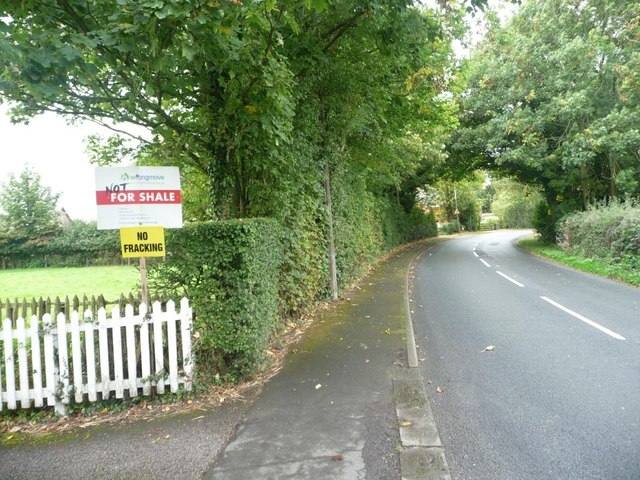The British government has ramped up its efforts to buy public support for fracking since Theresa May came to power. But is it having any luck?
A new government proposal released this month hinted that households in an area with shale drilling sites could each receive a cash pay-out. And 10 days later the new energy minister wrote in a Lancashire newspaper about the benefits fracking would bring to the area.
But press releases from the residents concerned, a new YouGov opinion poll and insights from Greenpeace all suggest the government’s promises have fallen flat.
Cash Pay-Outs
Earlier this month Theresa May unveiled plans to pay out up to 10 percent of the tax revenues from fracking directly to households in areas hosting drilling sites.
The Prime Minster had rewritten plans set out by George Osborne, which would have transferred the funds to local community trusts or councils instead.
The consultation on the Shale Wealth Fund suggests a maximum pay-out of £10 million to each community or region associated with an individual shale site over the course of around 25 years, the expected lifetime of a site.
An exact figure was not specified in the consultation, but rumours circulated across the national papers of a £10,000 sum per household.
‘Latest Bribe’
But it seems the cash handout has failed to buy support. In fact only a third of the public would support fracking in their area even if households were paid up to £10,000, according to a YouGov survey published last week.
The poll, commissioned by Friends of the Earth, found 43 percent “strongly” or “tend to” oppose fracking, while 25 percent remained “unsure”.
Liz Hutchins, Friends of the Earth’s senior political strategist, said it was clear from the survey that people “haven’t been fooled by the government’s latest bribe”.
She said: “The government’s efforts to incentivise shale gas exploration seem to have fallen on stony ground. When you look at the details of the scheme, any cash for households would only be after shale exploration, and would be derived from taxation on profits.
“It all seems a pretty unlikely and distant proposition.”
Tackling Climate Change
A second push to promote fracking was then launched on 16 August when the new energy minister, Lucy Neville-Rolfe, wrote a letter in the Blackpool Gazette.
She promised that fracking and the Shale Wealth Fund would bring greater control and jobs for local communities and economic benefits to the whole country.
Neville-Rolfe echoed May’s proposals to transfer some funds to individual local residents.
She wrote that the government’s regulations on emissions mean: “that we can continue to tackle climate change while taking advantage of the benefits this new industry could provide.”
The paper that published her letter, the Blackpool Gazette, circulates in Lancashire, where a decision on whether Cuadrilla should be allowed to explore for shale gas is due in October.
Donna Hume, Friends of the earth campaigner, told DeSmot UK the government was desperate to do “almost anything to get people onside”.
“But the public support for fracking just isn’t there,” she added. “Any payment to households seems at best a very distant proposition given that it would have to come from taxation after a well had proven profitable.
“Support for fracking is dropping, not rising. We should be going all out for clean, renewable energy, not propping up a dying industry.”
‘Spectacularly Discredited’
The energy minister’s letter immediately sparked backlash from campaign groups based in areas earmarked for shale exploration.
Frack Free Lancashire said it remained unconvinced by Baroness Lucy Neville-Rolfe’s vision of shale gas as an exciting opportunity.
In a statement the group said: “The Conservative government still appears to be on the slow foot of technology with their continued dependence on fossil fuels, when worldwide, countries are striding forward with renewable technologies such as solar, hydro and wind power.”
Claire Stephenson from Preston New Road Action Group called the Shale Wealth Fund scheme “underwhelming” and “a transparent attempt at cash in exchange for social acceptance”.
“Baroness Neville-Rolfe seems rather confused regarding the jobs argument from fracking: Cuadrilla’s statistics were spectacularly discredited during the planning inspector’s hearing in Blackpool as fanciful figures.”
‘Just Not True’
Meanwhile letters poured in to various papers in protest at the minister’s letter, as public fury mounted.
And in the comments section readers pointed out that the cash pay-out would do nothing to alleviate the predicted fall in house prices fracking would bring or increase in insurance premiums.
By then Greenpeace’s Energydesk had also pointed out the government’s fracking pay-out claim was “just not true” anyway.
Dissecting the payment policy and government spin around its announcement, Energydesk editor Damian Kahya goes on to explain: “Even once the industry is up and running, the whole plan depends on the government raking in around £10bn in tax from shale gas – which could politely be described as optimistic.”
Doug Parr, policy director Greenpeace UK, said: “First, the government tried to bribe local communities. Now they’re going for individual households. It won’t work.
“People won’t sacrifice their fresh air, clean water and local tranquillity for a vague and conditional few thousand pounds which is tossed their way years after the frackers get their way.
“The principle is wrong in any case – quality of life should not be for sale.”
Photo: Christine Johnstone via Geography
Subscribe to our newsletter
Stay up to date with DeSmog news and alerts







